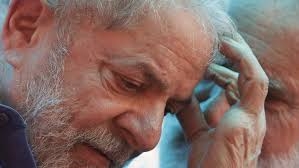Brazil race begins in earnest with da Silva off party ticket

Brazil's Workers' Party on Tuesday replaced jailed former President Luiz Inacio Lula da Silva as its candidate for October's general election, clarifying one of the biggest question marks hanging over the vote to lead Latin America's largest nation.
The party confirmed the move after a meeting of its executive committee in the southern city of Curitiba, where da Silva is jailed. Fernando Haddad, a former Sao Paulo mayor, will lead the ticket and be joined by Manuela D'Avila, a member of Brazil's Communist Party.
The move, while long expected, was an acknowledgement that the party could not get da Silva, who Brazilians universally call Lula, on the ballot despite numerous attempts in the courts.
"The struggle has just begun. Let's go, Haddad! Haddad is Lula!" the Workers' Party Twitter account said. "He was a Lula minister, he is a Lula attorney and best of all: he is a friend of Lula's."
The political science professor turned education minister and later politician met with da Silva Tuesday after the decision, then delivered his first speech as the candidate in front of hundreds of supporters in front the federal police building where da Silva is jailed.
"I feel the pain of many Brazilians who won't be able to vote for who they want," said Haddad, standing next to D'Avila and other Workers' Party heavyweights. "But now is not the time to have your head down."
Da Silva is serving a 12-year sentence for trading favors with construction company Grupo OAS for the promise of a beachfront apartment. The former president, who governed between 2003 and 2010, has always denied wrongdoing, arguing this case and several others pending against him are meant to keep him off the ballot.
Da Silva led polls for more than a year, but his candidacy was recently barred by the country's top electoral court. The court gave the party until Tuesday to replace da Silva.
In a lengthy letter distributed by the Workers' Party, da Silva recounted what he called "lies and persecution" that he and his family had suffered and urged supporters to vote for Haddad.
"Today and going forward, Fernando Haddad will be Lula for millions of Brazilians," wrote da Silva.
The strategy of holding on to da Silva's candidacy until the absolute last minute caused much internal fighting within the party. Many believed that leaving Haddad so little time to present his case to voters was risky, while others thought it was best to keep da Silva front and center as long as possible.
"Haddad and I are like Lionel Messi and Luis Suarez," da Silva once said, referring to super star teammates on FC Barcelona's soccer club. "We play together and we don't even need to look at each other to know what the other is doing."
Rival candidates have frequently taken shots at Haddad, attacking the centerpiece of the party's strategy: his dependence on da Silva.
Brazil will have "a little president" if Haddad is elected, said left-leaning candidate Ciro Gomes last month.
"The theater of the Workers' Party is over," right-leaning Geraldo Alckmin said Tuesday.
Recent polls show Haddad far behind, but the party hopes he will now rise with da Silva's endorsement. The current poll leader is far-right congressman Jair Bolsonaro, consistently over 20 percent in a race that puts several candidates at around 10 percent.
Haddad was education minister under da Silva and his successor, Dilma Rousseff. In 2012 he was elected mayor of Sao Paulo, the most populous city in South America, but failed to get re-elected four years later.
A Datafolha poll published on Monday shows Haddad in fourth place, favored by 9 percent. That was a rise of five percentage points in just a few weeks, but still behind Bolsonaro's 24, Gomes' 13, centrist Marina Silva's 11 and Alckmin's 10 percent.
The poll had a margin of error of 2 percentage points. All the 2,804 voters sampled were interviewed on Monday, days after da Silva's candidacy was barred by the electoral court and Bolsonaro was stabbed in an incident that might put him in hospital until election day.
If no candidate gets more than 50 percent on Oct. 7, a runoff will be held on Oct. 28.
Political science professor Alberto Almeida, who has written several books on Brazilian polls, believes Haddad has a lot of potential to gain popularity, despite the little time for his campaign.
"By next week, it is possible that Haddad grows enough to see Marina and Ciro behind him. That was predictable because of Lula's high support at around 40 percent in the polls," Almeida said, adding: "The race is clearer now."
